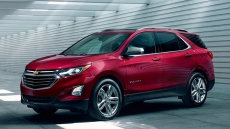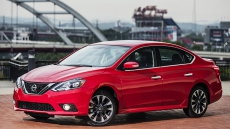We took the boosted model out to see if the term muscle car is still appropriate
Like with Ford during the introduction of the EcoBoost Mustang, naysayers had a field day when Chevrolet originally announced a turbocharged four-cylinder version of the sixth generation Camaro. Now three years old, it just got a facelift and we took the boosted model out to see if the term muscle car is still appropriate.
So what’s new for 2019? The front end of our 1LT is definitely meaner looking. The mesh grille, housing slimmer LED dual element headights, extends much deeper into the bumper than before, and the lower central intake connects to the ones in the corners.
Our Riverside Blue Metallic tester had the optional 1LE Track Performance Package installed (+$5,195) that gives the complementary twin lamp taillights a really cool colourless smoked appearance to them. The bundle also adds a blacked-out front splitter, hood wrap, subtle trunk spoiler and wide 20-inch alloy wheels, among a whole host of interior and performance upgrades.

The cabin has a good blend of raciness and usability, featuring a suede-wrapped flat bottomed steering wheel and shift knob, and a seven-inch touch display — running the latest Chevrolet Infotainment 3 software — which is curiously angled downwards, presumably to mitigate glare on a sunny day.
Another unique design choice is the placement of the hazard light toggle directly ahead of the shifter. More than once I turned them on whether via an accidental poke or having my phone slide and hit the button under braking. Finally, unlike pretty much any other vehicle I’ve been in, changing the temperature and fan settings involves twisting the ring around the central two circular air vents. Definitely interesting.
The fabric seats provide great support. A high-definition backup camera is standard, and really comes in handy given the sliver of a rear window and the blind spot created by the girthy C pillar. Surprisingly, trying to crack the window end up is a bit of a chore due to oversensitive switches. Pressing down even a little too hard results in triggering the auto-down feature.
Circling back to engine, yes — this Camaro is powered by a forced-induction four-banger. Would one know it by driving it? Maybe. Rated at 275 horsepower and 295 lb-ft of torque, the output is certainly there. As with most turbo applications, a tad of lag upon acceleration is discernable. Things pick up in a hurry, though and the 1LT can move. If only the compact motor generated the same sound the V8 in the SS grade makes.

In addition, thanks to the aforementioned track pack, the spec DARPAN drove possessed Brembo brakes, limited slip differential, uprated suspension (larger diameter front and rear stabilizer bars, stiffer dampers and more) and a better cooling system. The car also benefited from a precise-feeling six-speed manual transmission, although some sort of lockout mechanism would be nice to prevent an unintentional shift into reverse instead of first gear.
On the road, the Camaro behaves as expected. Cool and composed when driven conservatively, but turn the wheel and quickly push the gas pedal down at the same time and the rear will try to come out and say hello. That said though, even over several days of consecutive rain there were no sketchy moments behind the wheel.
Planning on handing the keys to a youngster? Chevy’s innovative Teen Driver mode is equipped, allowing parents and guardians to set limits on various vehicle functions and receive a generated report card detailing operator behaviour.
Highlights (as tested):
MSRP: $35,660
Motor: 2.0-litre turbocharged four cylinder
Horsepower: 275 @ 5,600 rpm
Torque (lb-ft): 295 @ 3,000 rpm
Gearbox: Six-speed manual
Layout: Front engine, rear-wheel drive
Fuel economy: 14.3 L/100 km mixed city/highway (observed)


